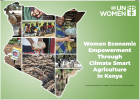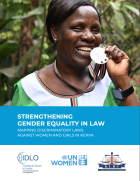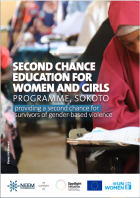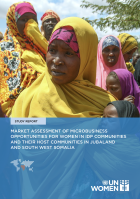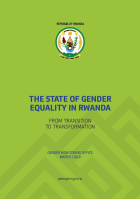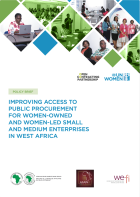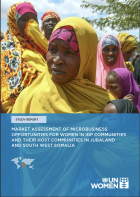1 - 20 of 21 Results
Pagination
Date:
The WEE-CSA Storybook showcases the success stories of over 2,400 women from Kitui, Laikipia, and West Pokot who have transformed their lives through climate-smart agriculture. Funded by KOICA and implemented by UN Women Kenya, it highlights the project's impact on livelihoods and gender equality while sharing valuable lessons learned. This collection celebrates resilience and aims to inspire further community upliftment for sustainable development in Kenya.
Date:
Under the leadership of the Ministry of Gender, Child, and Social Welfare, in collaboration with the Ministry of Peace Building, and with support from UN Women and international funding, the Women’s Charter empowers women and girls to engage with the Reconstituted National Constitutional Review Commission (R-NCRC). Launched on May 29, 2024, in Juba, the Charter addresses twelve critical themes, advocating for comprehensive legal, policy, and programmatic interventions in the Permanent Constitution-making process.
Date:
UN Women and International Development Law Organization (IDLO), in partnership with the Kenya Law Reform Commission. Researcher/writer: Dr. Consolata Ngondi; Ms. Petronella Mukaindo
Date:
Under the Joint UN-EU Spotlight initiative, the Second Chance Education center for Women and Girls, Sokoto, was established to ensure GBV survivors in Sokoto get a second chance at economic empowerment and basic education. This document highlights some of the human impact stories made by the Joint UN-EU Spotlight initiative in Sokoto
Date:
This Report presents the Africa Shared Research Agenda (ASRA) for ending gender-based violence (GBV), which was developed though a collaboration between UN Women Africa and the Sexual Violence Research Initiative. The ASRA is a set of research priorities for the field, developed through a participatory and consultative process and aims to inform investments in research over the coming 5-10 years for ending GBV in Central, East, Southern and West Africa.
Date:
The publication aims to understand the current landscape of microbusiness in terms of the opportunities, barriers and challenges that women in displacement settings face in accessing economic opportunities in the cities of Kismayo, Dollow and Baidoa
Date:
This publication highlights the progress and prevailing gender gaps in Rwanda so far as far as Gender Equality and Women's Empowerment is concerned. It also gives insights into the state of gender equality in the National Strategy for Transformation (NST1) pillars.
Date:
Women own 30 per cent of the small and medium businesses worldwide, yet women-owned businesses only access 1 per cent of all procurement contracts suggesting systemic gender disparities within procurement systems. This policy brief analyses the extent to and ways in which regional institutions in West Africa could adopt better policies for gender-responsive procurement.
Date:
The policy brief aims to serve as an synthesizes and presents key findings from UN Women-led research; regional online surveys and; advocacy on. making the AfCFTA work for (young) women and (young) women-led businesses, both in the design and implementation of gender-responsive AfCFTA policy reforms and complementary measures, as well as in the soon-to-be negotiated AfCFTA Protocol on Women and Youth in Trade.
Date:
Empowering women in the economy and closing gender gaps in the workspace is key to achieving the 2030 Agenda for Sustainable Development and achieving the Sustainable Development Goals in Somalia. The host community landowners and IDP casual laborers can jointly build their skills in climate-smart agriculture that can benefit the productivity of farms whilst also building the knowledge and skill set of IDPs.
Date:
This analytical study covered ten countries in the region and looked at issues of access to justice for women and girls in East and Southern Africa.
Date:
The purpose of this study was to develop a variety of texts documenting case studies of good and promising practices in the area of the protection of rights and access to services for women with disabilities in East and Southern Africa (ESA) during the COVID-19 pandemic.
Date:
The UN Women WCARO annual report aims to share information about the regional office's activities on women empowerment and gender equality in 2020. The said year has been a particularly difficult year around the world with the COVID-19 pandemic. In West and Central Africa (WCA), women and girls were particularly vulnerable to the crisis. To counter these burdens and build medium and long- term recovery measures, the UN Women WCA Regional Office successfully provided multi-faceted assistance...
Date:
The African Continental Free Trade Area (AfCFTA) an opportunity for growth and prosperity in Africa. However, because of pre-existing inequalities in African economies, the agreement’s benefits will not be distributed equally along gender lines. As the AfCFTA Secretariat is starting to draft a Women in Trade Protocol, it is important that women across the continent participate actively in the process to voice their views, interests, and needs. This advocacy brief highlights 9 important...
Date:
This continental study provides a contextual analysis of the forced displacement of women and girls in Africa based on first hand data from field visits made to the Central African Republic, Ethiopia, and Nigeria. The analysis provides the key priority considerations for the realisation of durable solutions for refugees, IDPs and returnees in Africa and makes recommendations for actions by the AU, Member States and relevant stakeholders within the context of AGA and APSA.
Date:
The policy paper assesses the state of Gender Based Violence (GBV) in Africa in the context of the COVID-19 pandemic. Informed by evidence from the five African Union (AU) regions, it outlines some of the initiatives implemented in AU Member States. The paper also proposes recommendations towards multi-sectoral response and recovery efforts that address GBV as well as the related needs of women and girls in Africa.
Date:
The rapid assessment publication on Gender and Agricultural Mechanization in Ethiopia provides clear recommendations to inform the agricultural mechanization policy currently under development in the country by adding value to the process through introduction of gender responsiveness approach. The assessment also aims to strengthen enforcement of the existing agricultural mechanization by evaluating current practices in gender and mechanization in the...
Date:
The crisis caused by the COVID-19 pandemic must be viewed with a gendered lens to protect women and girls and address the increase in VAWG during this pandemic. In Ethiopia, this can be accomplished with accelerated and concerted efforts of the Government and the United Nations, in partnership with other development agencies and national civil society organizations. This Policy brief presents overview of the increased in GBV in Ethiopia and give recommendations on measures to be taken to address the issue.
Date:
UN Women regional office for East and Southern Africa has collected a number of good practices that are replicable and are feasible within the framework of engagement with traditional leaders and cultural authorities to end harmful practices against women and girls. These are just but a few selected examples of how these stakeholders have contributed to the efforts towards ending child marriage, FGM/C and other harmful practices against women and girls in Africa.
Date:
UN Women East and Southern Africa continues to STEP IT UP for gender equality on a daily basis to give voice to women and girls who are still challenged with the violence, injustice, unequal opportunities and prejudices because of their gender.

